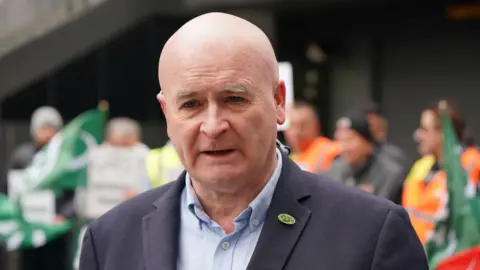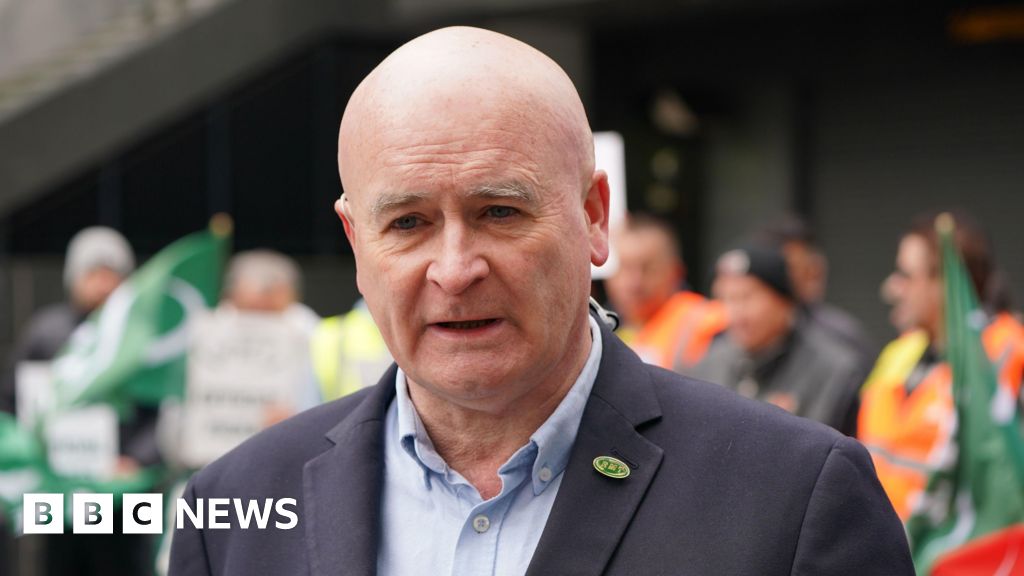[ad_1]
 PA Media
PA MediaRail workers expect the same terms as those offered to train drivers to end their strike action, the boss of the RMT union has said.
Mick Lynch told the Times he expected a “parallel, synchronised offer” to that offered to drivers’ union Aslef on Wednesday.
That agreement, which could end more than two years of walkouts, saw drivers offered a three-year pay deal, including a 4.75% rise this year.
The new Labour government also dropped attempts by the previous Tory administration to change drivers’ working practices.
It comes ahead of meetings next week between the government and the RMT to negotiate a pay deal for this year.
Shadow cabinet minister Chris Philp accused Labour of losing control over pay deals, adding all unions would demand “double-digit rises”.
Under the terms of a deal brokered last November, RMT members, including train guards and signalling staff, were offered a backdated 5% rise for last year, the same as that offered to Aslef members under their three-year deal.
The RMT deal said this year’s pay offer would depend on formal negotiations with individual train companies on working conditions.
It is understood the agreement included a commitment to negotiate reforms at a local level for an expected 4% rise this year.
That amount would be below the 4.75% offered to Aslef drivers for this year as part of the deal to settle their dispute. Drivers have also been offered 4.5% for next year, which would take the average driver salary to around £68,000.
Speaking to the Times, Mr Lynch said: “All things being equal, we are expecting a parallel, synchronised offer to that of Aslef.
“All the indications are that we will be offered the same terms as Aslef. And we are expecting that it will be delivered,” he told the newspaper, adding there could be “problems” if this is not the case.
Direct talks
The government has not yet said how the Aslef deal will be paid for. A senior rail industry source said the taxpayer is likely to have to contribute towards funding it, as it may exceed what train companies had set aside in their budgets.
The government effectively took control of the railways during the Covid pandemic, with most train companies in England moving onto contracts where they get a fixed fee to run services, and the taxpayer carries the financial risk.
A number of major operators, including TransPennine Express, have also been taken under public control in recent years.
Labour, which took over pay negotiations from the companies after returning to power at last month’s election, has argued the settlements are justified by an estimated £1bn cost to the economy from strike action.
The previous government had claimed it was merely a facilitator of talks between the unions and train companies, although in reality it was the main player in the talks due to the financial situation.
Working practices
However the deal with Aslef, described as “no strings” by the Labour-affiliated union, has also raised questions over the fate of changes to working conditions pursued by the previous Conservative government.
The terms of November’s RMT deal saw discussions over changes to working practices, such as rotas and weekend working, pushed back into this year.
Labour, which wants to fully renationalise nearly all remaining privatised passenger rail services over the next five years, has said it wants to put in place a “workforce strategy” for companies taken over by the government.
Despite the pay deal, Aslef announced on Friday that drivers at London North Eastern Railway (LNER), a nationalised firm, would strike every weekend in September, October and two in November in a dispute with management.
Nigel Roebuck, who has led Aslef’s negotiations with LNER, said members had complained about being consistently “badgered for favours” by managers “outside of rostering agreements and being contacted remotely”.
Tory Commons leader Chris Philp said pay rises awarded by Labour, including a 22% increase for junior doctors over two years, would lead to tax rises at the Budget in October.
“None of the increases come with commitments to reform or improve. All the public gets is a much bigger tax bill,” he posted on social media.
[ad_2]
Source link



